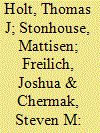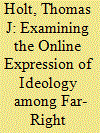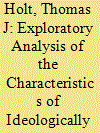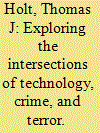|
|
|
Sort Order |
|
|
|
Items / Page
|
|
|
|
|
|
|
| Srl | Item |
| 1 |
ID:
178932


|
|
|
|
|
| Summary/Abstract |
Over the last two decades, there has been a massive increase in research examining terror and extremist-related violence. Few have considered the extent to which these same groups may engage in attacks against digital infrastructure and the Internet, whether through hacking or other methods. The absence of empirical evidence calls to question the nature and dynamics of cyberattacks performed by extremists and ideologically motivated actors. This study attempted to address this gap in the literature through a qualitative investigation of 26 attacks performed by far-left groups against targets in the UK, US, and Canada from 2000 to 2015. This data was compared to physical attacks documented in the Extremist Crime Database during the same period. The findings demonstrated that there was an increase in cyberattacks during a period of decreased physical violence by far-left groups. Additionally, there was some parity in the targets of far-left groups on- and off-line, with similar motivations to cause harm to or embarrass businesses, government organizations, and individuals. The implications of this study for our understanding of terror and future research were discussed in detail.
|
|
|
|
|
|
|
|
|
|
|
|
|
|
|
|
| 2 |
ID:
188035


|
|
|
|
|
| Summary/Abstract |
Over the last decade, there has been an increased focus among researchers on the role of the Internet among actors and groups across the political and ideological spectrum. There has been particular emphasis on the ways that far-right extremists utilize forums and social media to express ideological beliefs through sites affiliated with real-world extremist groups and unaffiliated websites. The majority of research has used qualitative assessments or quantitative analyses of keywords to assess the extent of specific messages. Few have considered the breadth of extremist ideologies expressed among participants so as to quantify the proportion of beliefs espoused by participants. This study addressed this gap in the literature through a content analysis of over 18,000 posts from eight far-right extremist forums operating online. The findings demonstrated that the most prevalent ideological sentiments expressed in users’ posts involved anti-minority comments, though they represent a small proportion of all posts made in the sample. Additionally, users expressed associations to far-right extremist ideologies through their usernames, signatures, and images associated with their accounts. The implications of this analysis for policy and practice to disrupt extremist movements were discussed in detail.
|
|
|
|
|
|
|
|
|
|
|
|
|
|
|
|
| 3 |
ID:
188079


|
|
|
|
|
| Summary/Abstract |
Web defacement is a form of hacking that involves altering the content of a website, resulting in repairs to the website code, loss of revenue, internal loss of productivity, and reputational damage. Limited research has examined the frequency of web defacements, the factors that distinguish them from other hacking motives, and the extent to which the correlates mirror research on physical acts of ideologically-motivated crime. The current study examined over 2.4 million web defacements hosted in the U.S. from 2012 to 2016 to assess aspects of routine activities theory associated with target selection and attack methods among ideologically-motivated defacements. A binary logistic regression analysis revealed that ideologically-motivated defacers were more likely to use unknown vulnerabilities; engage in repeated attacks; target top-level domains linked to foreign nations; domains ending in.edu; and homepages within websites. The findings of this study suggest that the target selection process of ideologically-motivated defacers are more purposive and designed to draw attention to their cause, resembling target preferences of individuals who engage in physical violence in support of an ideological agenda.
|
|
|
|
|
|
|
|
|
|
|
|
|
|
|
|
| 4 |
ID:
112620


|
|
|
|
|
| Publication |
2012.
|
| Summary/Abstract |
The Internet and computer-mediated communications (CMCs) have drastically changed the way that individuals communicate and share information across the globe. Over the last two decades, financial institutions, private industry, and governments have come to rely on technology in order to access sensitive data and manage critical infrastructure, such as electrical power grids. As a consequence, the threat posed by cybercriminals has increased dramatically and afforded significant opportunities for terrorist groups and extremist organizations to further their objectives. The complex and intersecting nature of both crime and terror make it difficult to clearly separate these issues, particularly in virtual environments, due to the anonymous nature of CMCs and challenges to actor attribution. Thus, this study examines the various definitions for physical and cyberterror and the ways that these activities intersect with cybercrime. In addition, the ways that terrorists and extremist groups use the Internet and CMCs to recruit individuals, spread misinformation, and gather intelligence on various targets are discussed. Finally, the uses of computer hacking tools and malware are explored as a way to better understand the relationship between cybercrime and terror.
|
|
|
|
|
|
|
|
|
|
|
|
|
|
|
|
|
|
|
|
|